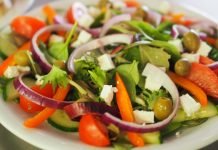Last Updated on July 21, 2024 by Nasir Hanif
In Lebanon, Vinegar is a wide ingredient which has the property of giving many foods a unique taste. It is a typical component of the kitchen because its origin is natural sources such as apples and grapes. Lebanese chefs depict how the vinegar contributes greatly to the taste of food as it is used in anything ranging from salads to meat dishes. This basic element is widely accepted as a significant part of food heritage in Lebanon, which implies reliance on what nature offers to enrich meals.
Table of Contents
Versatility of Vinegar in Lebanese Cuisine
In the creation of the Lebanese Cuisine a variety of vinegars are used in order to give the food a different taste. Every vinegar contributes its own style so each dish you eat will have a special and unforgettable taste and feel. This not only gives an intensity of taste but also makes the food better.
- Balsamic Vinegar: This product really brings out the inherent sweetness to make cookouts with grilled vegetables and meats taste even better. This way it gives more depth to the taste, even the simplest dishes become a food worth remembering.
- Apple Vinegar: It works great for salad, especially one that gets the name, Fattoush, because it brings in a crisp and tart flavor that just takes your breath away.
- White and Red Grape Vinegar: These vinegars are more softer than apple vinegar, yet still they delightfully contribute acidic notes to stews and pickles, keeping the flavor balance. The acidity from the tartness added to the dish balances and maintains the overall taste.
- Red Vinegar: Like that amber color, it is strong and bold which does a good job of what marinating does for meats. It can sink into the meat making it flavorful and the commercial applications of those who like strong-tasting meat giving it a robust flavor that’s perfect for hearty meals.
- White Vinegar: Known for its sharp and clean flavor, white vinegar is perfect to add to sauce or dip to counter the richness of the dish. The purpose of this one is also to be able to store some vegetables by keeping them fresh and tasty.
These vinegars play significant roles in Lebanese kitchens, each bringing its own flavor that helps define the cuisine’s vibrant taste.
The Many Uses of Vinegar Beyond The Kitchen
Besides the usual application as culinary essence, vinegar is used in Lebanon and in many other cultures to achieve different ends. It is an important element for cleaning and their natural disinfecting activity can be used to kill bacteria on different home surfaces. Vinegar is also used in beauty routines, like hair rinsing, to rejuvenate your hair shine and keep your scalp pH balance. Classical medicine appreciates it for its various benefits, among them easing digestion and keeping blood glucose levels in check. Vinegar possesses immense versatility in the kitchen and daily life, thus it is no surprise that this common ingredient represents a cultural icon of the past.
Cultural Significance of Vinegar in Lebanon
Vinegar is honored with long-standing history and culture in Lebanon, with it being used in the past for preservation and flavoring of food.
It is one of the oldest and most diverse condiments used not only in the kitchen but also in medicine and around the house.
Vinegar is as much an integral part of rituals in traditional Lebanese culture as it is in the day-to-day practices surrounding some cleaning before religious holidays, a symbol of purifying and rejuvenation. Beside its gastronomic significance, this spice also goes hand-in-hand with all vital aspects of Lebanese life and traditions, reflecting how they are resourceful and value natural food items.
Lebanese Producers Shaping Global Tastes
Vinegar manufacturing in Lebanon winds from small scale manufacturing to larger enterprise based production all maintaining the rich culinary heritage of the region. Such manufacturers usually process local ingredients like grapes from Lebanese vineyards to make vinegars that are traditional and at the same time have that creative touch. As a result, this industry meets both local cuisine and global market demands and takes emphasis on organic and natural production methods in order to supply to growing necessity of high- quality, sustainable products. This expresses the will to honor the traditional flavors and at the same time be capable of adapting to contemporary tastes and health requirements.
Lastly, the Lebanese vinegars that are obtained from fruits such as grapes and apples play a crucial role in bringing out the true flavors and taste of both traditional and modern Lebanese dishes. They can be used creatively in dishes, from salads to marinades, and not only stay inside the kitchen but also be taken to clean the rooms or used for health remedies.
The Lebanese use of vinegar in their culture goes beyond rituals to their everyday life, which highlight its historical importance. Lebanese producers, from small artisans to large companies, continue to innovate while honoring this rich heritage, ensuring Lebanese food products remain a vital part of global culinary tastes.
Apart from that if you want to know about “Arabic Salad Recipe: How to Make A Simple But Delicious Arabic Salad” then please visit our “Recipes” Category.



























